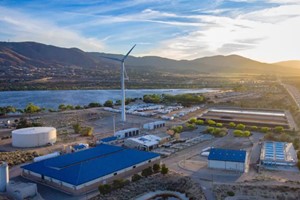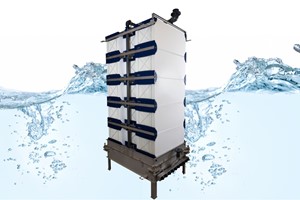Microfiltration is a low pressure separation process utilizing membranes with very open pore structures. Microfiltration filters can be made with both organic materials, such as polymer based membranes, as well as inorganic materials, such as ceramic or stainless steel. In selecting the appropriate membrane, spiral-wound polymeric microfiltration filters are often the starting point for consideration, based on spiral MF’s balance of durability, membrane area per unit, and significantly lower membrane unit cost, and equipment capital cost vs. ceramic and stainless options.
MF Products
Microfiltration membranes have the most open pore sizes of all polymeric membranes. With a pore size range of 0.1 to 10μm, microfiltration membranes are capable of separating large suspended solids such as colloids, particulates, fat, and bacteria, while allowing sugars, proteins, salts, and low molecular weight molecules pass through the membrane. MF membranes feature an asymmetric pore structure, with tighter surface pores to control rejection, and more open macrovoids in the membrane cross section, in order to optimize flux.
Synder Filtration currently offers three types of polymeric microfiltration membrane filters, all of which maintain good resistance to pH, temperature, and fouling tendencies. They are also commonly used as a pretreatment step for feed stream applications. These PVDF microfiltration membrane filters are manufactured to sustain excellent chemical and heat resistance, and are available in both spiral-wound and flat sheet configurations, to provide more flexibility for customization around specific process applications.
Synder’s sanitary microfiltration membranes are also compliant with FDA standards listed in CFR Title 21, 3-A Sanitary Standards No. 45-02, as well as USDA sanitary standards and are fit for use in a variety of sanitary, as well as industrial applications across a broad spectrum of industries.
MF Applications
Microfiltration is a physical separation process that removes contaminants such as suspended solids, fats, and microbes from process fluids. Microfiltration may also be used in combination with other membrane technologies such as reverse osmosis, nanofiltration, and ultrafiltration. Common applications of Synder’s MF membrane technology include:
Dairy:
- Fat / microbial removal in Whey Protein Concentrate / Isolate
- Casein / Whey fractionation
- Clarification of fermentation broths
- Microbial removal, clarification
Food / Beverage:
- Plant extract clarification
- Gelatin clarification
- Wine clarification
- Corn wet milling
Industrial / Wastewater Treatment:
- Industrial process wastewater treatment













